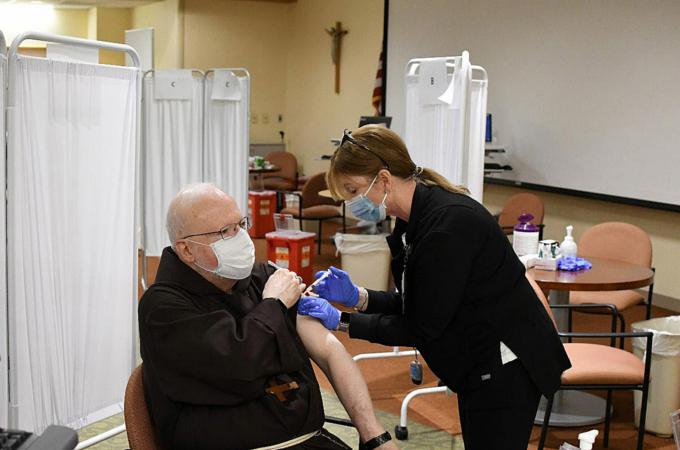Cardinal O'Malley receives coronavirus vaccine, encourages others to be vaccinated
BRIGHTON -- Cardinal Seán P. O'Malley received the first of the two-dose protocol of the Moderna vaccine for the coronavirus Dec. 24 at St. Elizabeth's Medical Center. The archdiocese said that the cardinal "hopes to demonstrate that the vaccine is safe and wishes to encourage people to be vaccinated when possible."
In a statement, Cardinal O'Malley expressed his gratitude to Dr. Joseph Weinstein, chief physician executive of the Steward Health Care Network, who offered to arrange his vaccination after learning that the 76-year-old cardinal qualified for it.
"With recognition of the importance that all persons be vaccinated when possible I was very happy to receive this invitation," Cardinal O'Malley said.
St. Elizabeth's Medical Center is one of the Steward Health Care hospitals in the archdiocese. Cardinal O'Malley was welcomed by the center's president, James Terwilliger, and its director of spiritual care, Chaplain Elizabeth Goeke. He is scheduled to receive his second dose there in late January 2021.
"I am grateful to have been in line for the vaccine," Cardinal O'Malley said.
Many Catholics have expressed concerns about whether it is morally permissible to receive the forthcoming coronavirus vaccines, given their possible connections with a cell line derived from an aborted fetus. The US Conference of Catholic Bishops has released guidance for the Catholic faithful, addressing these concerns.
The cell line in question is HEK293, which originated in kidney cells taken from the body of a child aborted in the Netherlands in 1972. The companies Pfizer and Moderna used this cell line in confirmatory tests for their vaccines. AstraZeneca, whose vaccine has not yet been approved for use in the US, used it in both development and testing of its vaccines.
In a Dec. 14 statement, "Moral Considerations Regarding the New COVID-19 Vaccines," the chairmen of the USCCB's committees on doctrine and pro-life activities said that the vaccines' connection "is very remote from the initial evil of the abortion." Given the gravity of the coronavirus pandemic and the lack of available alternatives, they said, the reasons to accept the new COVID-19 vaccines are "sufficiently serious to justify their use."
The bishops went so far as to say that receiving a coronavirus vaccine would be "an act of love of our neighbor and part of our moral responsibility for the common good."
Cardinal O'Malley expressed similar sentiments in his Dec. 31 blog entry.
"I want to encourage all people to be vaccinated as the opportunity is presented, as an important action of care and concern for our loved ones, our communities and our nation. With the help of God and the excellent medical care provided at St. Elizabeth's and many other hospitals, we will make our way through and beyond the pandemic," Cardinal O'Malley said.



















